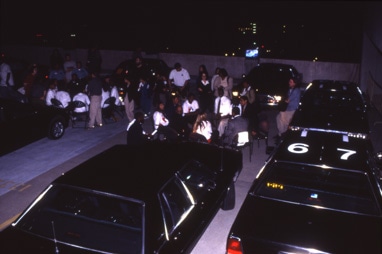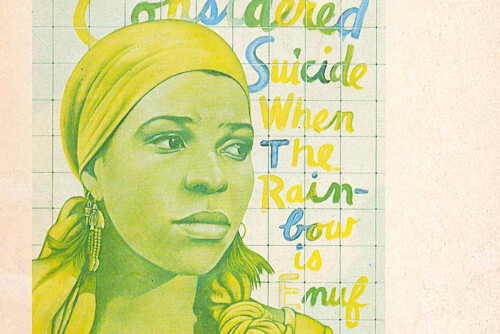“They Say, Let Those Who Call for a New Language First Learn Violence” 1
If feminist nonviolence movements have sometimes confused the violence of patriarchy with the violence of men, these movements have also often challenged the rigid gendering of violence through their own reliance on violent metaphors and fantasies. At a San Francisco antinuclear rally in March 1982, for example, Alice Walker began her speech by quoting a curse-prayer that Zora Neale Hurston collected in the 1920s. Her comments on this curse are worth quoting at length:
I have often marveled at it. At the precision of its anger, the absoluteness of its bitterness. Its utter hatred of the enemies it condemns. It is a curse-prayer by a person who would readily, almost happily, commit suicide, if it meant her enemies would die. Horribly.
I am sure it was a woman who first prayed this curse . . . . And I think, with astonishment, that the curse-prayer of this colored woman – starved, enslaved, humiliated and carelessly trampled to death – over centuries, is coming to pass . . . . And it is this hope for revenge, finally, I think, that is at the heart of People of Color’s resistance to any anti-nuclear movement.
In any case, this has been my own problem.
When I consider the enormity of the white man’s crimes against humanity. Against women. Against every living person of color. Against the poor. Against my mother and my father. Against me. . . . When I consider that he is, they are, a real and present threat to my life and the life of my daughter, my people, I think – in perfect harmony with my sister of long ago: Let the earth marinate in poisons. Let the bombs cover the ground like rain. For nothing short of total destruction will ever teach them anything. 2
After September 11, 2001, Jean Baudrillard described the “new terrorists” as people who turn “the violence mobilized by the system” against it, and who “do not play fair, since they put their own deaths into play.” 3 Walker here seems to share these traits, the traits of a terrorist imagination. As she repeats the curse of the woman who “would readily . . . commit suicide, if it meant her enemies would die,” what distinguishes her from Baudrillard’s new terrorists? On one level, it seems important to say something like, “Not much,” to acknowledge that feminist activists have repeatedly spoken threats of violent destruction, and have occasionally acted upon them. 4 From this, we can learn that, for feminism, social justice begins with the acknowledgment of, and commitment to wrestle with, the extremes of violence that exist within ourselves. Refusing to inhabit a position of uncontaminated purity, Walker places herself inside a long history of feminist-terrorist imaginings and, as a result, she cannot be assimilated to the “us” of “us and them.” Yet nor is she simply one of “them,” for Walker’s feminist-terrorist thinking is marked by her unwillingness to idealize the banality of death: “Life is better than death,” she asserts, “if only because it is less boring, and because it has fresh peaches in it.” This statement does not cancel out Walker’s recognition of the appeal, even the pleasure, of violent language and action; it simply shows her stepping back from enacting Hurston’s curse, at least for now, because the world still has “fresh peaches” in it. These peaches come in varied forms, they are often hard to find, and they grow in strange places – sometimes even in our classrooms. As feminists, we must cultivate their growth wherever we happen to be, and fiercely protect and expand the spaces where they thrive. Then, as our peaches ripen, we must dare to eat and share them, for their sweetness holds both our melancholia and our violence at bay.
- Wittig, Les Guérillères, 85.[↑]
- Alice Walker, “Only Justice Can Stop A Curse,” in Reweaving the Web of Life: Feminism and Nonviolence, ed. Pam McAllister (Philadelphia: New Society, 1982), 262-265, at 264.[↑]
- Jean Baudrillard, The Spirit of Terrorism (London: Verso, 2002), 18-19.[↑]
- Radical feminist manifestos often actively embrace this terrorist mindset. See Barbara A. Crow, Radical Feminism: A Documentary Reader (New York: New York University Press, 2000), and Peter Stansill and David Zane Mairowitz, eds., BAMN (By Any Means Necessary): Outlaw Manifestos and Ephemera, 1965-70 (Brooklyn: Autonomedia, 1999), for samples, including the SCUM Manifesto (Society for Cutting Up Men), the Redstockings Manifesto, the Bitch Manifesto, and the WITCH Manifesto (Women’s International Terrorist Conspiracy from Hell). It is also important to note that there have also been feminist terrorist organizations that have acted on these fantasies of violent destruction, such as the Wimmin’s Fire Brigade and the still-active German feminist group, Rota Zora, which first appeared in 1973. See Dark Star, Quiet Rumours: An Anarcha-Feminist Reader (San Francisco: AK Press U.S.A., 2002).[↑]


![On [Not] Watching the Video](https://sfonline.barnard.edu/wp-content/uploads/2019/09/Seeds-of-Justice-COVER-1-e1571082420171-500x334.jpg)
